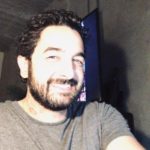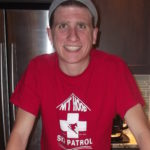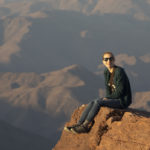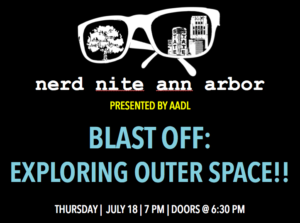It’s an all-star, all-SPACE lineup for this round of NNA2, friends! In honor of the 50th anniversary of the moon landing, we are exploring the final frontier with three amazing talks!
Electrical engineer Jordan Budhu will walk us through the communication tools used by exploration rovers to beam their findings back to Earth’s eager audiences. Space enthusiast Sam Carpenter will be telling the story of NASA’s Apollo missions. Astronomy PhD candidate Larissa Markwardt will outline the search for as-as undiscovered planets lurking at the edges of our solar system.
It’s going to have SCIENCE! It’s going to have HISTORY! It’s going to be STAR*-STUDDED! (*As in, you know, gas balls.) It’s going to be fun and interesting and eye-opening and great so text a friend now and tell them you’ll see them there!
When: Thursday, 7/18/19
Doors at 6:30/talks at 7 pm
Where: LIVE, 102 S. First St
Cost: Free! With love, from your friends at the Ann Arbor District Library!
 Jordan Budhu – Talking to Other Planets: Antennas for Satellites and Planetary Exploration Rovers
Jordan Budhu – Talking to Other Planets: Antennas for Satellites and Planetary Exploration Rovers
Billions of dollars are spent on developing spacecraft and planetary exploration rovers to probe the universe or visit other planets, however, the most important component on these spacecraft is the communications antenna. This talk will explore the concept of electromagnetic radiation and the fundamental working principles of antennas. Then we will discuss some designs for planetary exploration rovers and satellite spacecraft. The listener will leave with an understanding of how an antenna radiates and how we use them to communicate with space-borne instruments.
About Jordan:
He received his M.S. degree in electrical engineering from the California State University, Northridge, California, USA, in 2010, and the Ph.D. degree in electrical engineering from the University of California, Los Angeles, California, USA, in 2018. He is currently a Research Fellow in the Radiation Laboratory at the University of Michigan, Ann Arbor, Michigan, USA. In 2011 and 2012, he was a Graduate Student Intern at the NASA Jet Propulsion Laboratory. In 2017, he was named a Teaching Fellow at the University of California, Los Angeles. His research interests are in antenna theory, computational electromagnetics algorithms, and scattering from inhomogeneous, anisotropic materials. Dr. Budhu’s awards and honors include the 2010 Eugene Cota Robles Fellowship from UCLA, the 2012 Best Poster award at the IEEE Coastal Los Angeles Class-Tech Annual Meeting, the 2018 Henry Samueli School of Engineering and Applied Science Excellence in Teaching Award at UCLA, and the first place award for the 2019 USNC-URSI Ernst K. Smith Student Paper Competition at the 2019 Boulder National Radio Science Meeting.
 Samuel Carpenter – Making the Impossible Possible: Lessons from Apollo
Samuel Carpenter – Making the Impossible Possible: Lessons from Apollo
In 1962 under President Kennedy’s direction, our nation committed itself to “landing a man on the moon and returning him safely to earth.” At the time, this goal was physically impossible. In order to accomplish this goal, it had to be broken down into component tasks. Accomplishing these tasks determined the mission objectives of the Mercury, Gemini and Apollo programs. I will discuss not only the accomplishments these early space exploration efforts but I will also outline a general process of how to take on impossible goals. You will be able to apply this process in your own lives in order to achieve your ‘impossible’, whatever that happens to be.
About Samuel:
Samuel is a Pennsylvania native who recently relocated to Ann Arbor from Portland, OR. Throughout a career in academic research and volunteering as a prehospital medical provider, he has maintained an avid interest in space exploration history as well as current progress of existing space programs. Find him on Twitter @carpensa1.
 Larissa Markwardt – Hidden Planets
Larissa Markwardt – Hidden Planets
Could there be a planet lurking at the edge of our Solar System that we haven’t discovered yet? Maybe! It’s happened before. In this talk, I will explain how the orbits of objects we already know about in our Solar System can be used to infer the existence of yet unseen planets. I will also discuss the history and science of the discoveries of Neptune and Pluto, searches for other hypothetical planets (Planet X and Vulcan), and the current hunt for Planet 9.
About Larissa:
Larissa is a PhD candidate in Astronomy and Astrophysics and NSF graduate research fellow at the University of Michigan. She studies tiny, faint, and distant space rocks in our Solar System, specifically Earth Trojans and Kuiper Belt Objects. In her free time she likes to go hiking and kayaking, play board games, and watch Stargate. Find her on Twitter @LarMarStar.
